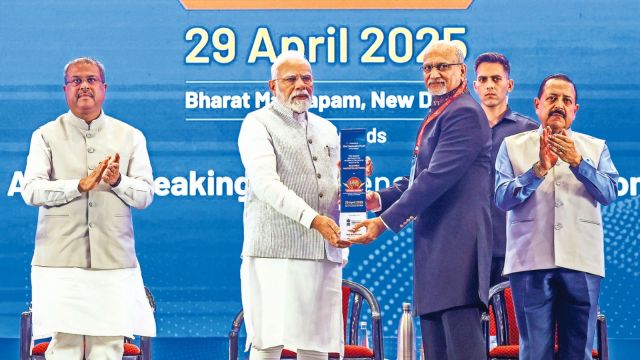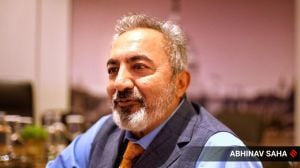PM Modi: Govt modernising education system for 21st century needs
Modi said that the future of the country depends on its youth, making it necessary to prepare them for their own as well as the country’s bright future.
 Prime Minister Narendra Modi with Union Ministers Dharmendra Pradhan and Jitendra Singh in New Delhi. PTI
Prime Minister Narendra Modi with Union Ministers Dharmendra Pradhan and Jitendra Singh in New Delhi. PTIThe new National Education Policy (NEP) was prepared keeping in mind the global standards in education, and after the NEP was introduced, the country is seeing a big change in the Indian education system, Prime Minister Narendra Modi said on Tuesday.
“Now Indian students are beginning to get a modern education, and new ways are being forged for their careers,” Modi said at the Yugm innovation conclave organised by the Ministry of Education and the Wadhwani Foundation, a tech organisation founded by entrepreneur Romesh Wadhwani.
Modi said that the future of the country depends on its youth, making it necessary to prepare them for their own as well as the country’s bright future. Adding that the education system plays a big role in this, he said: “This is why we are making the country’s education system modern, in line with the needs of the 21st century.”
He said that the National Curriculum Framework, teaching-learning material, and new textbooks for classes 1 to 7 have been developed, along with the PM e-Vidya and Diksha platforms for digital education infrastructure. “Through the National Credit Framework, it has become easier for students to learn different subjects at the same time,” he added.
Pointing to the goal of strengthening the country’s research ecosystem, Modi said that work has progressed rapidly in this direction, and resources have increased. “Many state-of-the-art research parks have been set up across the country. Research and development cells have been set up in 6,000 higher education institutions. Innovation culture is developing rapidly in India with our efforts. Around 40,000 patents were filed from India in 2014, now this has increased to over 80,000,” he said.
He referred to the setting up of the Anusandhan National Research Foundation (ANRF) as a step towards encouraging research, and added that the One Nation One Subscription scheme ensures easier access to “world-class research journals.”
Referring to the youth of India as “ready, disruptive, and transformative,” Modi said that university campuses are also becoming dynamic centres where “the youth drives breakthrough innovations.”
“Our institutions are opening campuses abroad – IIT Delhi in Abu Dhabi, IIT Madras in Tanzania. In Dubai, IIM Ahmedabad is preparing to set up a campus. It is not just that our top institutions are going abroad, but top universities abroad are also coming here,” he said.
He said: “Only the trinity of talent, technology, and temperament can transform India’s future and take India to the pinnacle of success,” adding that for the goal of Viksit Bharat, a timeline of the next 25 years has been set.
“Our time is limited, our goals are big…so, it is necessary that our journey from idea and prototype to product be shortened. When the distance between lab and market is shortened, the results of research can reach people faster…For this, it is necessary that our research ecosystem…,” he said.







